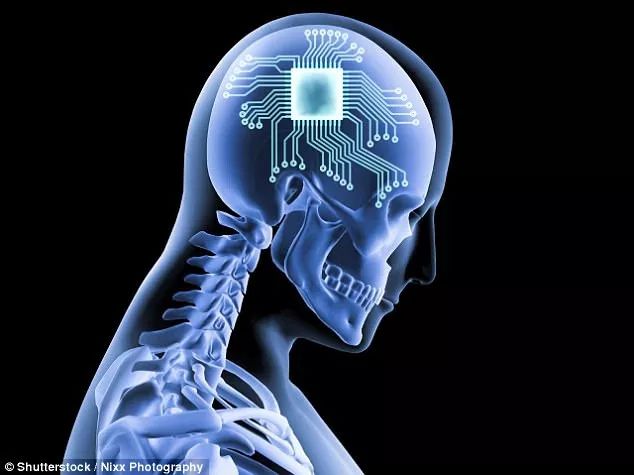AI芯片植入人脑:改善情绪并使注意力更集中
据外媒报道,美国国防部高级研究计划局(DARPA)正在研发一款可以植入人脑的人工智能芯片,可以通过算法监测大脑中的情绪障碍,并利用电子脉冲改变大脑的化学反应,从而实现深层次的脑部刺激,使大脑自动恢复健康状态。另外,有专家认为芯片植入有助于监测帕金森、抑郁症、癫痫等大脑、神经疾病的发作,实现健康跟踪;以及帮助人类集中注意力。但是对大脑信息的探索也面临着伦理道德方面的风险。
The US military has begun testing AI brain implants that can change a person's mood on humans.
These 'mind control' chips emit electronic pulses that alter brain chemistry in a process called 'deep brain stimulation.'
If they prove successful, the devices could be used to treat a number of mental health conditions and to ensure a better response to therapy.
The chips are the work of scientists at the Defense Advanced Research Projects Agency (DARPA), a branch of the US Department of Defense which develops new technologies for the military.
Researchers from the University of California (UC) and Massachusetts General Hospital (MGH) designed them to use artificial intelligence algorithms that detect patterns of activity associated with mood disorders.
Once detected, they can shock a patient's brain back into a healthy state automatically.
Experts believe the chips could be beneficial to patients with a range of illnesses, from Parkinson's disease to chronic depression.
Speaking to Nature, Edward Chang, a neuroscientist at the University of California, said: 'We’ve learned a lot about the limitations of our current technology.
'The exciting thing about these technologies is that for the first time we’re going to have a window on the brain where we know what’s happening in the brain when someone relapses.'
The chips were tested in six people who have epilepsy and already have electrodes implanted in their brains to track their seizures.
Through these electrodes, the researchers were able to track what was happening in their brains throughout the day.
Older implants are constantly doing this, but the new approach lets the team deliver a shock as and when is needed.
By tracking a patient's brain activity over the course of one to three weeks, they were able to create an algorithm to ‘decode’ their moods.
The MGH team then discovered that by delivering shocks to regions of the brain that deal with decision-making and emotions, participants performed significantly better in set tasks.
This included matching images of numbers or identifying emotions on faces.
Difficulties with concentration and problems with empathy are characteristics of a range of mood disorders.
Although researchers won't be able to read people's minds, the chips do raise a number of ethical concerns.
Alik Widge, engineering director of the MGH team, added: 'We will have access to activity that encodes their feelings.'
Dr Widge’s group is working with neuroethicists to address the moral implications of their work.
The full findings of the study were published in the journal Nature.
http://www.dailymail.co.uk/sciencetech/article-5120441/Mind-control-AI-chips-alter-persons-moods.html
招聘|AI学院长期招聘AI课程讲师(兼职):日薪5k-10k



